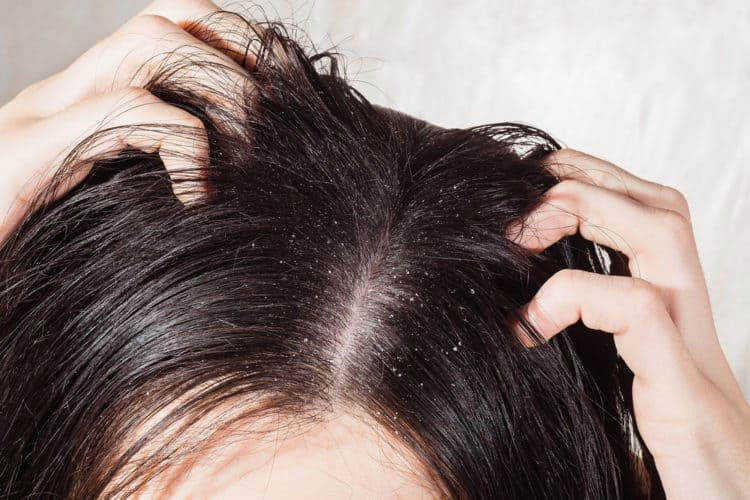What is dandruff?
Dandruff is a common scalp condition that affects more than 50% of the population and is characterized by visible white scales in your hair.
What is dandruff?
Dandruff is a chronic disease that occurs in the scalp, manifestations of the disease are flaking of dead skin on the scalp and this symptom can range from mild to severe. In rare cases, dandruff causes hair loss if left untreated. Dandruff flakes can fall on their shoulders. Sometimes, you may feel dry and itchy.
The disease does not affect the overall health, but will affect the quality of life, making you uncomfortable and afraid to communicate.

The symptoms of dandruff are easy to see, white patches of dead skin on the hair.
Signs and symptoms of dandruff
The symptoms of dandruff are easy to see: white patches of dead skin, slightly lustrous on the hair, shoulders and may be accompanied by itching. This condition can be worse in the fall and winter because the heating device can make the skin dry. Symptoms usually decrease during the summer.
Dandruff is also called 'buffalo shit' disease - a folk disease in young children. Dandruff can occur in infants and infants. However, this disease is not dangerous and usually goes away on its own.
You may experience other symptoms and signs not mentioned. If you have any questions about the signs of illness, consult your doctor.
Dandruff is not a serious problem, but if over-the-counter medicines or shampoos cannot relieve the disease or if the scalp becomes red or swollen, you should see a dermatologist because you may has had seborrheic dermatitis or something like dandruff.
Causes of dandruff
Some reasons why you have dandruff like:
- Stimulates oily skin (seborrheic dermatitis): this is one of the most common causes of dandruff and can cause skin redness or oily skin covered with white or yellow scales;
- Do not wash your hair often : when you do not regularly wash your hair, oil and dead skin cells from the scalp can accumulate, causing dandruff; special cases such as using dandruff shampoo without dandruff;
- Mushroom malassezia : living on the scalp most adults. In some cases, it irritates the scalp and makes the scalp cells grow too fast;
- Dry skin : Dandruff from dry skin is usually smaller and less oily than other causes. In addition, redness or swelling of the skin rarely occurs;
- Sensitive to hair care products : Sometimes sensitive to certain ingredients in hair care products or harms of hair dyes can cause red, itchy or scaly scalp.
People at risk of dandruff
Dandruff occurs at all ages and is common in men. You can limit the disease by reducing risk factors. Please talk to your doctor for more information.
Factors that increase the risk of dandruff
There are many factors that increase the risk of dandruff such as:
- Age : dandruff usually begins in adulthood and continues to occur in middle age. However, does not mean that older people will not have dandruff. Sometimes, this situation can last a lifetime;
- Male hormone : because the proportion of men with dandruff is higher than that of women, it is thought that the cause may be due to male hormones;
- Oily hair and oily skin : having greasy skin and hair is more likely to cause dandruff caused by fungus malassezia eating oils on your scalp.
- Neuropathy: like parkinson's disease, HIV or other immunodeficiency diseases can also cause seborrheic dermatitis.
Effective dandruff treatment
The information provided does not replace the advice of health professionals, so it is best to consult your doctor.
The doctor can easily diagnose dandruff by observing your hair and scalp.
You need to use shampoo to treat dandruff . For severe cases, you may need to use doctor-prescribed shampoo, steroid creams or antifungal creams.
Living habits help you limit dandruff
You will be able to control dandruff if the following measures are applied:
- Shampoo daily with shampoo containing tea tree oil. Remember not to scratch your scalp when using shampoo, just gently massage your scalp so as not to damage your hair or scalp. In addition, you should avoid using hair products such as hairspray and gel until the dandruff is completely cured.
- Reduce stress to help you avoid dandruff and other diseases.
- Explain the status of dandruff often appear in the summer
- How is dandruff born?
- Detecting dandruff in dinosaur fossils 125 million years
- Is it a piece of dry scalp?
- Causes of dandruff on the scalp
- Using ginger to treat dandruff, hair loss is more effective than medicine
- Guess whale age through 'dandruff' on the skin
- 10 uses of Aspirin that you don't know
- French suspended circulation Nizoral tablet form
- Very simple ways to prevent and treat diseases you should know
- Stamping automobile shell with virtual technology mold
- The external robot arm costs only 65 USD
 Chinese doctors have created medical masks that cover only the nose for convenience of eating and drinking
Chinese doctors have created medical masks that cover only the nose for convenience of eating and drinking Scientists have found a way to help you regrow new teeth after only 2 months
Scientists have found a way to help you regrow new teeth after only 2 months Do non-stick pans cause cancer? What alternatives are there?
Do non-stick pans cause cancer? What alternatives are there? Opaque urine: Causes, diagnosis and treatment
Opaque urine: Causes, diagnosis and treatment